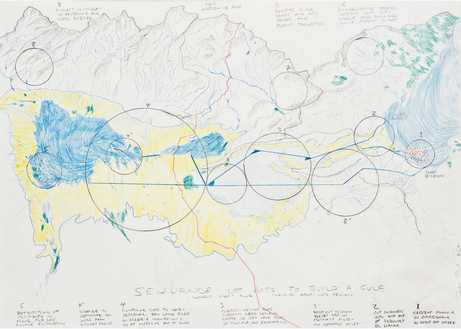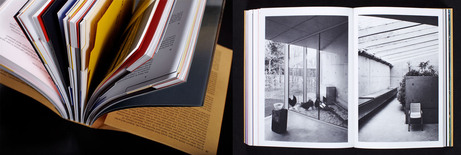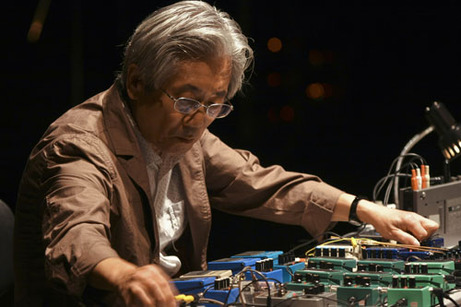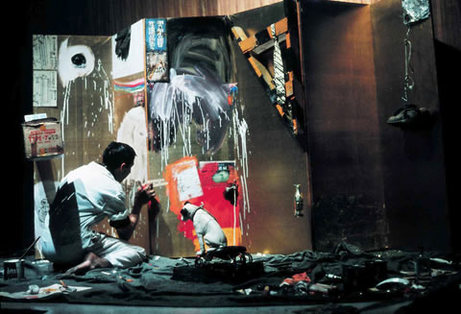Wiel Arets: Autobiographical References and featured project Hedge House, Wijlre, the Netherlands, 1998-2001.
Wiel Arets: Autobiographical References
Wiel Arets and Robert McCarter
Apr 26, 2013
(6:30pm)
Talk
Please RSVP
Wiel Arets: Autobiographical References (Birkhäuser, December 2012) offers a unique and unparalleled view of Arets, an internationally renowned architect and recently appointed dean of the College of Architecture at the Illinois Institute of Technology. Arets’ optimistic outlook towards the future, which he calls ‘A Wonderful World: A New Map of the World’, underlies his global philosophy. This new book presents Arets’ lectures on that topic, debates between him and other thinkers and makers, 60 exemplary designs from his studio, and an extensive series of interviews with Arets. Within these texts his background, education, projects, and teachings are interwoven in a discussion that highlights the evolution of his career.
At this book launch event, a discussion between Arets and Robert McCarters, editor of the book, will offer a comprehensive introduction to the work of Wiel Arets Architects. The talk will be followed by a reception in the Madlener House library where signed copies of the publication will be available for purchase.
Wiel Arets is a Dutch born architect, educator, industrial designer, theorist, and urbanist. Arets’ architecture and design firm, Wiel Arets Architects, has offices in Amsterdam, Berlin, Maastricht, and Zurich, and has been nominated numerous times for the European Union’s Mies Van der Rohe award. Before being appointed dean at IIT, Arets was dean of the Berlage Institute in Rotterdam from 1995-2002 and a professor of building, planning, and design at the Berlin University of the Arts.
Robert McCarter is a practicing architect, author, and Ruth and Norman Moore Professor of Architecture at Washington University in St. Louis. He previously taught at the University of Florida, where he was director of the School of Architecture from 1991-2001, Columbia University, University of Louisville, and North Carolina State University. He is the author of Understanding Architecture: A Primer on Architecture as Experience (with Juhani Pallasmaa, 2012); Wiel Arets: Autobiographical References (2012); Frank Lloyd Wright: Critical Lives (2006); Louis I. Kahn (2005); Frank Lloyd Wright (1997), and other books.
This event was originally scheduled for February 1, 2013.

LAMPO
Takehisa Kosugi
Apr 20, 2013
(8pm)
RSVP required
|
|
In this special solo performance, Takehisa Kosugi performs several compositions of multi-dimensional live electronic music including some shortened versions of longer work, most of which was originally commissioned for the Merce Cunningham Dance Company. Kosugi revises the material for quad sound using homemade audio generators, ready-made sound processors and light-sound interactive materials. The program includes Cycles (1981), Streams (1991), Op Music (2001), Music for Nearly 90, Part-A (2009), and Octet (2011).
|
|
|
|
Takehisa Kosugi (b. 1938, Tokyo, Japan) is a composer for mixed-media music, and an early member of Fluxus. In 1960, he co-founded Group-Ongaku ("music group"), with Yasunao Tone, Mieko Shiomi, and others, the first collective improvisation group in Tokyo. While in New York from 1965 to 1967, Kosugi created new works in collaboration with Nam June Paik and other Fluxus members. In 1969 he co-founded the Taj Mahal Travellers, an itinerant septet for mixed-media improvisation that toured England, Europe and the Near East in 1971-72. Kosugi joined the Merce Cunningham Dance Company in 1977 as a composer and performer where he toured with John Cage and David Tudor. He was appointed music director in 1995, and worked with the company until 2011. Kosugi has received grants from The JDR 3rd Fund (1966 and 1977), a DAAD fellowship grant to reside in Berlin (1981), and the John Cage Award for Music from Foundation for Contemporary Performance Arts (1994). He has performed in countless international festivals, and his installations have been presented in exhibitions throughout the world. Kosugi performed in the Lampo series in March 2000, in concert with Jim O'Rourke at the Museum of Contemporary Art, Chicago.
This performance is presented in partnership with Lampo. Founded in 1997, Lampo is a non-profit organization for experimental music, sound art and intermedia projects. Visit www.lampo.org.
|


Peter Fend, Sequence of Acts to Build
A Gulf, 2011
CANCELLED - New Geographies 5
THE MEDITERRANEAN: WORLDS, CITIES, REGIONS, AND ARCHITECTURES
Apr 18, 2013
(6pm)
Panel Discussion
Please RSVP
Please note that due to unfavorable weather conditions this event has been cancelled.
Volume 5 of the Graham-funded New Geographies journal aims to recast the Mediterranean as a contemporary phenomenon and spatialize its region-making processes as a larger geographic entity in the twenty-first century. On April 18, Antonio Petrov, editor-in-chief of Volume 5, considers major topics of the new issue with Sean Keller, Clare Lyster, and Hashim Sarkis in a panel discussion moderated by Stephen J. Ramos. A reception and book signing will follow.
New Geographies is a Harvard University Graduate School of Design journal that aims to examine the emergence of the geographic, to articulate it and bring it to bear effectively on the agency of design. As the synthesizing role that geography aspired to play among the physical, the economic, and the sociopolitical is now being increasingly shared by design, New Geographies encourages designers to reexamine their tools and develop strategies within the design disciplines.
Cofounder and editor of New Geographies, Antonio Petrov is a professor at the University of Texas in San Antonio. He is currently program director at Archeworks in Chicago, founder and editor-in-chief of DOMA, a bilingual magazine published in Macedonia, and the director of WAS, a think tank located in Chicago. Petrov’s research explores new discourses in regionalism and architecture with a focus on the Mediterranean. His book, Superordinary: New Paradigms in Sacred Architecture,is forthcoming. Petrov received his doctoral degree from Harvard University.
Sean Keller (Assistant Professor, Illinois Institute of Technology; Ph.D. Harvard University) is a historian and critic of modern and contemporary architecture. He has taught at Harvard and Yale universities and is a trustee of the Graham Foundation for Advanced Studies in the Fine Arts. He is a frequent contributor to Artforum and has written for numerous anthologies and journals, including Grey Room, Perspecta, Journal of Architectural Education, and Art Journal. He has two books forthcoming: Semi-Automatic: Motivating Architecture After Modernism (University of Chicago Press) and, with Christine Mehring,Munich ’72: Art and Architecture (Yale University Press).
Clare Lyster, Assistant Professor at University of Illnois at Chicago, is an architect, writer, and educator and founding principal of Claire Lyster Urbanism And Architecture (CLUAA) in Chicago. Her work explores the city from the perspective of its landscape and networks and the implications of this for architectural design. She is editor of Envisioning the Bloomingdale: 5 Concepts (Chicago Architecture Club, August 2009) and 306090 vol. 09 Regarding Public Space, with Cecilia Benites (Princeton Architectural Press, August 2005). Her writings have appeared in many publications including Cabinet, Journal of Landscape Architecture, Journal of Architectural Education and The Landscape Urbanism Reader and her design work has been exhibited locally and internationally including the Art Institute of Chicago. Current work toward a publication exploring the relationship between architecture and logistics was funded by a research grant from the Graham Foundation.
Stephen J. Ramos is an Assistant Professor in the College of Environment and Design at the University of Georgia. He is author of Dubai Amplified: The Engineering of a Port Geography (Ashgate Press,2010), and co-editor of Infrastructure Sustainability and Design (Routledge, 2012). He is a founding editor of the journal New Geographies and editor-in-chief of New Geographies Volume 1: After Zero (GSD/Harvard University Press, 2009). He received his Doctor of Design degree from Harvard University Graduate School of Design.
Hashim Sarkis is the Aga Khan Professor of Landscape Architecture and Urbanism in Muslim Societies at Harvard University Graduate School of Design. Sarkis is a practicing architect in Cambridge and Lebanon, working on urban and landscape projects. He has authored and edited many books and articles including Josep Lluís Sert: The Architect of Urban Design, 1953–1969 (coedited with Eric Mumford, 2008), Circa 1958: Lebanon in the Pictures and Plans of Constantinos Doxiadis (2003), CASE: Le Corbusier’s Venice Hospital (2001), and Projecting Beirut (coedited with Peter G. Rowe, 1998).

Robert Rauschenberg creating the combine 'Gold Standard in Twenty Questions to Bob Rauschenberg,' Sogetsu Art Center, Tokyo, November 28, 1964. Photograph by Masaaki Sekiya. ©2011 Masaaki Sekiya. All rights reserved. Courtesy of the Solomon R. Guggenheim Museum, NY.
The Artist As Philanthropist: Artist-Endowed Foundations as a New Force in Cultural Philanthropy
Apr 10, 2013
(6pm)
Panel Discussion
Please RSVP
Please join us for a panel discussion exploring the emerging role of artist-endowed foundations as a force in cultural philanthropy and in the stewardship of contemporary art and design.
Research conducted by the Aspen Institute's National Study of Artist-Endowed Foundations, the first effort to examine the field of private foundations endowed by visual artists in the U.S., has documented more than 355 foundations, many created in the past two decades, holding $3.5 billion in assets, $2 billion of this in the form of art and intellectual property. With higher profile foundations bearing names such as Lichtenstein, Warhol, and Rauschenberg, these organizations make grants to nonprofits and to artists and scholars. They steward art collections and archives, contribute artwork to museums, operate artist residency centers, care for architecturally significant properties, and conduct cultural and educational programs. In 2010, members of the field made $70 million in aggregate grants. Among key trends documented by the Study is a rise in the number of foundations associated with architects and designers. The Study’s report may be viewed online at www.aspeninstitute.org/psi/a-ef-report.
Panelists include Sarah Herda, Director of the Graham Foundation for Advanced Studies in the Fine Arts and former director/curator of the Storefront for Art and Architecture; Christy MacLear, Executive Director of Robert Rauschenberg Foundation and former inaugural director of the Philip Johnson Glass House, a property of the National Trust for Historic Preservation; Stephen K. Urice, Professor of Law, University of Miami School of Law, and co-author of the standard art law casebook, Law, Ethics and the Visual Arts, Kluwer Law International (5th Ed. 2007); and Christine J. Vincent, Study Director, The Aspen Institute’s National Study of Artist-Endowed Foundations and former deputy director for media, arts and culture at the Ford Foundation. The panel will be moderated by Angelique Power, Senior Program Officer, Culture, the Joyce Foundation.
The Graham Foundation for Advanced Studies in the Fine Arts was created in 1956 by a bequest from architect Ernest R. Graham (1866–1936). The Foundation makes project-based grants to individuals and organizations and produces public programs to foster the development and exchange of diverse and challenging ideas about architecture and its role in the arts, culture, and society. The Foundation’s programs can be viewed online at www.grahamfoundation.org.
Robert Rauschenberg Foundation was formed by Robert Rauschenberg (1925-2008) in 1990 to promote awareness of the causes and groups close to his heart. Activities of the Foundation include managing the artwork, exhibition and scholarship of Robert Rauschenberg as well as the growth of the philanthropy programs that intersect art and issues central to the artist’s concerns during his lifetime. The Foundation’s programs are detailed online at www.rauschenbergfoundation.org
The Aspen Institute’s National Study of Artist-Endowed Foundations has been supported by a consortium of national and regional donors whose members include the Joyce Foundation.

Institute of Contemporary Art Boston by Diller Scofidio + Renfro. Photograph by Nic Lehoux.
Writing in the Present Tense
Grantee Edward Dimendberg will discuss his new book ‘Diller Scofidio + Renfro: Architecture After Images'
Apr 05, 2013
(6pm)
Talk
Please RSVP
Architecture and film scholar Edward Dimendberg discusses his Graham-funded book Diller Scofidio + Renfro: Architecture after Images (University of Chicago Press, 2013), the first full-length critical chronological monograph on the work of the New York-based architecture studio known for its integration of visual art, multimedia, and performance into its buildings and urban projects. Book signing and reception to follow the presentation.
Edward Dimendberg is professor of film and media studies, visual studies, and European languages and studies at the University of California, Irvine and the principal of Dimendberg Consulting LLC. He is the author of Film Noir and the Spaces of Modernity (2004), also supported by the Graham Foundation, and the co-editor of The Weimar Republic Sourcebook (1994).






 PREVIOUS POSTS
PREVIOUS POSTS